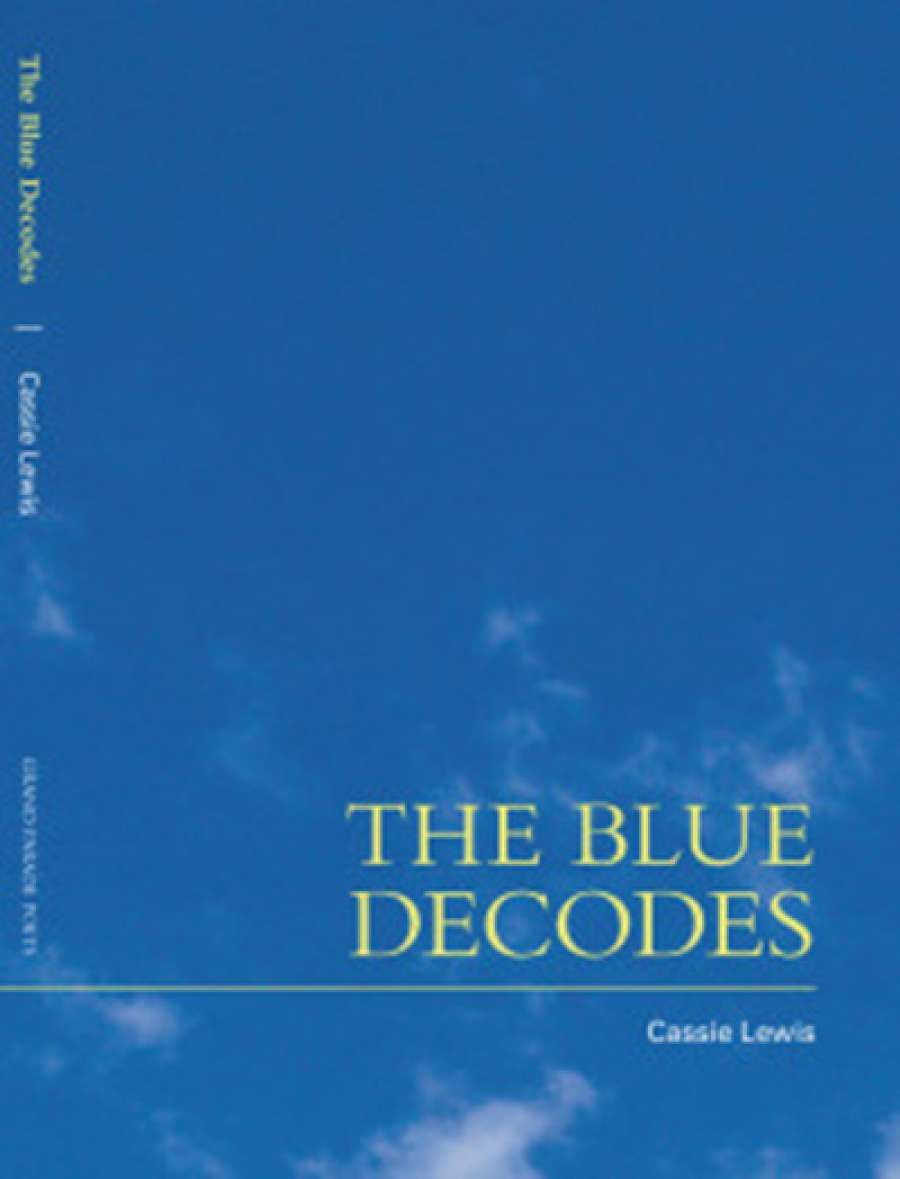
- Free Article: No
- Contents Category: Poetry
- Custom Article Title: Joan Fleming reviews 'The Blue Decodes' by Cassie Lewis and 'redactor' by Eddie Paterson
- Review Article: Yes
- Online Only: No
- Book 1 Title: The Blue Decodes
- Book 1 Biblio: Grand Parade Poets, $23.95 pb, 102 pp, 9780994600202
- Book 2 Title: redactor
- Book 2 Biblio: Whitmore Press, $24.95 pb, 118 pp, 9780987386687
- Book 2 Cover Small (400 x 600):

- Book 2 Cover (800 x 1200):

- Book 2 Cover Path (no longer required): images/ABR_Online_2017/September/redactor-400.jpg
Some of her sparer poems lack the subtlety of feeling in the collection’s shining majority. A section of pocket-sized poems, some ironic, some scribbly, read as scraps that might be integrated into a textual performance like the one sustained in ‘Bridges’, the long, wandering poem that concludes the book. Some phrases are recycled, like the beautifully humble description of the poet’s writing work in the wee hours: ‘to type is to construct little shanties for the night’. The book’s heart is a section of prose poem vignettes that are quite perfect. Here, the tension of spiritual grapple relaxes into koans like: ‘I read that leaving cold places one might feel, now it’s me who’s made of ice.’
A push and pull between the will to categorise and claim life, and to simply be in it, lends many of the poems their exquisite tension. The rare moments when the speaker performs the poet’s classic function of inciting the reader to intensive awareness or gratitude feel earned: ‘Today I’m the addressee of all that’s perfect’; ‘Don’t enlist your time on earth / just love it / and the four humours will let you speak your name.’ This is a substantial and mature collection that has been worth the wait.
 Cassie Lewis
Cassie Lewis
In redactor, Paterson acknowledges his debt to the cut-up, the collage, and the ‘ready-made’. Processes of reusing found objects have become central to the visual arts, but have still not found full credence in poetry. The collection revels in the sheer stupid pleasure of re-contextualisation. For example, census figures of religious orientation are spliced with figures of book sales: ‘catholics up 7 anglicans down 8.5 uniting down 15.5 novels up 17’. The poem ‘christmas instructions’ is a fine example of instructional text de-contextualised to pointed, worrying effect: ‘christmas was bought in 3 stories / & it is very important that they stay / merchandised in their stories ... / please / do not / spread christmas around the store.’ The book delights in the peculiarities and overplayed seriousness of such forms of writing.
 Eddie PatersonHowever, redactor is not thoroughly found poetry. The poem ‘flying into melbourne’ describes the jolt the speaker feels when he realises that what he is looking at is not, in fact, what he is looking at: mistaking ships for blimps, the harbour for the sky. That jolt is everywhere in the collection, as school notices and random email trails and news stories are recognised afresh as poetry. However, part of the book’s intelligence and fun is that the reader does not know what is reproduced verbatim, and what has been doctored. Everywhere, the poet’s sense of humour and wry aesthetic prevail. The book’s central conceit of joyfully and ironically ‘censoring’ the flood of information and bad writing that saturates our screen-based lives is balanced by love poems and intimate email poems, which culminate in a kind of self-portrait. Despite the dozens, perhaps hundreds, of source texts Paterson incorporates into his project, the last word of the book is still ‘me’.
Eddie PatersonHowever, redactor is not thoroughly found poetry. The poem ‘flying into melbourne’ describes the jolt the speaker feels when he realises that what he is looking at is not, in fact, what he is looking at: mistaking ships for blimps, the harbour for the sky. That jolt is everywhere in the collection, as school notices and random email trails and news stories are recognised afresh as poetry. However, part of the book’s intelligence and fun is that the reader does not know what is reproduced verbatim, and what has been doctored. Everywhere, the poet’s sense of humour and wry aesthetic prevail. The book’s central conceit of joyfully and ironically ‘censoring’ the flood of information and bad writing that saturates our screen-based lives is balanced by love poems and intimate email poems, which culminate in a kind of self-portrait. Despite the dozens, perhaps hundreds, of source texts Paterson incorporates into his project, the last word of the book is still ‘me’.


Comments powered by CComment